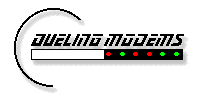NETIQUETTE
Overview
Discussion Groups
Email Etiquette
Acronyms & Emoticons
|
Overview
Netiquette is simply "network etiquette". Netiquette
refers to the rules of polite behavior on the internet. By following
simple netiquette guidelines, you can avoid unintentionally offending
people.
Discussion Group Etiquette
Dueling Modems' BBS is a conferencing system based on the
NNTP news protocol. NNTP news (or Usenet news) has been around a long
time (as the Internet goes, anyway), and has its own established
set of courtesies and behaviors.
DM is not Usenet.
Because Usenet groups are propagated
from server to server around the world, there are news behaviors
(like quoting and detailed sigfiles) that aren't as important on
a non-propagated system like DM and, in fact, can actually
get in the way of the open flow of conversation.
Following these guidelines will
smooth your passage in the Discussion Groups.
- Don't type in ALL CAPITALS. ALL CAPITALS is interpreted as shouting.
If you mean to shout, there are better ways of expressing yourself.
- Trim your quotes! Indiscriminate quoting destroys the flow of conversation.
If your newsreader supports auto-quoting, turn
it off.
Quote only the passages that you are actually responding
to. Use these guidelines:
- The amount you quote should usually be shorter than
your reply. It's polite to use an ellipsis (...) or the phrase
<snip> to indicate that material has been deleted from
a passage you're quoting.
- Remove the original poster's sig line from your quotes,
especially if it's long.
- Try recapping what was said, instead of quoting:
Joe said that Smith's prose is awkward; can we have an example of that?
- Keep Your Sigfile Short. Most Usenet etiquette guides
recommend using a signature file and keeping your sigfile to
six lines or less. On DM, all messages are posted with headers,
so a sigfile isn't really necessary; if you do use one, the shorter
the better.
- Follow Forum Guidelines. As stated in our
Policy Statement, DM
does not have system-wide guidelines on the use of profanity or
on the posting of personal attacks (flaming). Individual
Forum communities do develop their own sets of acceptable
behaviors, and DM supports the right of Forum sysops to establish
guidelines for their communities. If you have questions about
what's appropriate, email the Forum sysop.
- Don't Post Personal Information. Don't give out your home
phone number or address; if you need to provide this information
to someone online, send it via email.
- Spoilers. A spoiler is a post that gives away the
ending or a major plot point of a book, film, or TV episode. If
the subject of a conversation contains the word "spoilers", feel free
to disclose the identity of the one-armed man; otherwise, be sure
to put the words SPOILER WARNING (or something similar) at the top of your
post so that people who haven't seen the show will know to skip
your post.
- Cross-posting. In the internet news world, cross-posting
means posting the same message to more than one Group. Sophisticated
newsreaders can be set to filter out cross-posts, so that users read
the post only once. However, Free Agent, DM's Web Gateway, and other
programs do not filter out cross-posts, so some people may get to read
your post several times over. If your software supports cross-posts,
use them judiciously; cross-post messages where it makes sense.
- Don't Violate Copyright. Don't post copyrighted poetry
or song lyrics in newsgroups. Short excerpts from longer works
may be posted under the "fair use" guidelines, but it's always polite
to credit the original source.
- In general, assume good will. Consider whether
someone might be kidding with you (irony is very hard to detect online!),
or might have been misinformed by a seemingly trustworthy source.
Email Etiquette
- Don't type in ALL CAPITALS. ALL CAPITALS is interpreted as
shouting. If you mean to shout, there are better ways of
expressing yourself.
- Spamming. Spamming refers to sending unsolicited email;
usually it implies sending advertising or marketing messages to a whole
list of people, but some users consider any unsolicited email to
be spam. Feel free to politely ask questions or start conversations with
other DM members by email, but don't send marketing or advertising
messages to DM members or from your DM email account.
Acronyms and
Emoticons
Acronyms. If you're new to the online world, you may be bewildered by
the acronyms (abbreviations) that pepper many online conversations.
Here are some of the most common acronyms used on DM:
- BTW
- By the Way
- G,D,R
- Grin, Duck, Run
- FWIW
- For What It's Worth
- IMHO
- In My Humble Opinion
- LOL
- Laughing Out Loud
- OTOH
- On the Other Hand
- ROFL
- Rolling on the Floor Laughing
- YMMV
- Your Mileage May Vary
Emoticons or "smileys" are used
to indicate emotions in internet posts. A smiley :-)
usually means "just kidding", but putting smiley after a rude remark
doesn't make it any less rude.
Here are the most common emoticons (tilt your head to
the left to see the "face"):
- :-)
- Smile
- :-(
- Frown or pout
- ;-)
- Wink
- B-)
- Smile with glasses
- =:-O
- Surprise (Oh no!)
- :-P
- Sticking tongue out
There is a more complete
list
of acronyms and emoticons hosted by GeoCities.
TOP
|
